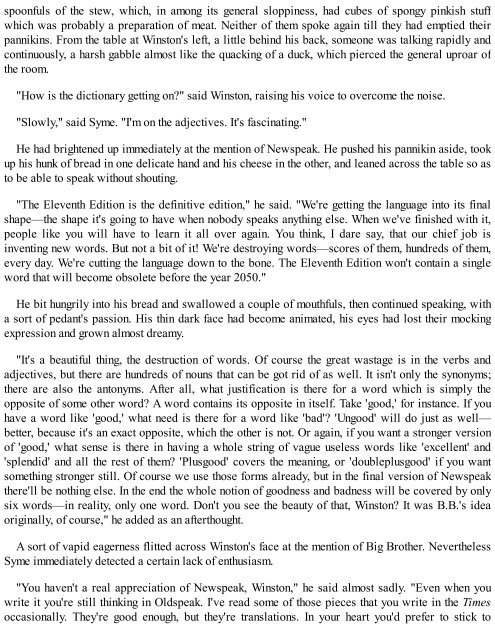You also want an ePaper? Increase the reach of your titles
YUMPU automatically turns print PDFs into web optimized ePapers that Google loves.
spoonfuls of the stew, which, in among its general sloppiness, had cubes of spongy pinkish stuff<br />
which was probably a preparation of meat. Neither of them spoke again till they had emptied their<br />
pannikins. From the table at Winston's left, a little behind his back, someone was talking rapidly and<br />
continuously, a harsh gabble almost like the quacking of a duck, which pierced the general uproar of<br />
the room.<br />
"How is the dictionary getting on?" said Winston, raising his voice to overcome the noise.<br />
"Slowly," said Syme. "I'm on the adjectives. It's fascinating."<br />
He had brightened up immediately at the mention of Newspeak. He pushed his pannikin aside, took<br />
up his hunk of bread in one delicate hand and his cheese in the other, and leaned across the table so as<br />
to be able to speak without shouting.<br />
"The Eleventh Edition is the definitive edition," he said. "We're getting the language into its final<br />
shape—the shape it's going to have when nobody speaks anything else. When we've finished with it,<br />
people like you will have to learn it all over again. You think, I dare say, that our chief job is<br />
inventing new words. But not a bit of it! We're destroying words—scores of them, hundreds of them,<br />
every day. We're cutting the language down to the bone. The Eleventh Edition won't contain a single<br />
word that will become obsolete before the year 2050."<br />
He bit hungrily into his bread and swallowed a couple of mouthfuls, then continued speaking, with<br />
a sort of pedant's passion. His thin dark face had become animated, his eyes had lost their mocking<br />
expression and grown almost dreamy.<br />
"It's a beautiful thing, the destruction of words. Of course the great wastage is in the verbs and<br />
adjectives, but there are hundreds of nouns that can be got rid of as well. It isn't only the synonyms;<br />
there are also the antonyms. After all, what justification is there for a word which is simply the<br />
opposite of some other word? A word contains its opposite in itself. Take 'good,' for instance. If you<br />
have a word like 'good,' what need is there for a word like 'bad'? 'Ungood' will do just as well—<br />
better, because it's an exact opposite, which the other is not. Or again, if you want a stronger version<br />
of 'good,' what sense is there in having a whole string of vague useless words like 'excellent' and<br />
'splendid' and all the rest of them? 'Plusgood' covers the meaning, or 'doubleplusgood' if you want<br />
something stronger still. Of course we use those forms already, but in the final version of Newspeak<br />
there'll be nothing else. In the end the whole notion of goodness and badness will be covered by only<br />
six words—in reality, only one word. Don't you see the beauty of that, Winston? It was B.B.'s idea<br />
originally, of course," he added as an afterthought.<br />
A sort of vapid eagerness flitted across Winston's face at the mention of Big Brother. Nevertheless<br />
Syme immediately detected a certain lack of enthusiasm.<br />
"You haven't a real appreciation of Newspeak, Winston," he said almost sadly. "Even when you<br />
write it you're still thinking in Oldspeak. I've read some of those pieces that you write in the Times<br />
occasionally. They're good enough, but they're translations. In your heart you'd prefer to stick to









![Genki - An Integrated Course in Elementary Japanese II [Second Edition] (2011), WITH PDF BOOKMARKS!](https://img.yumpu.com/58322134/1/180x260/genki-an-integrated-course-in-elementary-japanese-ii-second-edition-2011-with-pdf-bookmarks.jpg?quality=85)
![Genki - An Integrated Course in Elementary Japanese I [Second Edition] (2011), WITH PDF BOOKMARKS!](https://img.yumpu.com/58322120/1/182x260/genki-an-integrated-course-in-elementary-japanese-i-second-edition-2011-with-pdf-bookmarks.jpg?quality=85)





